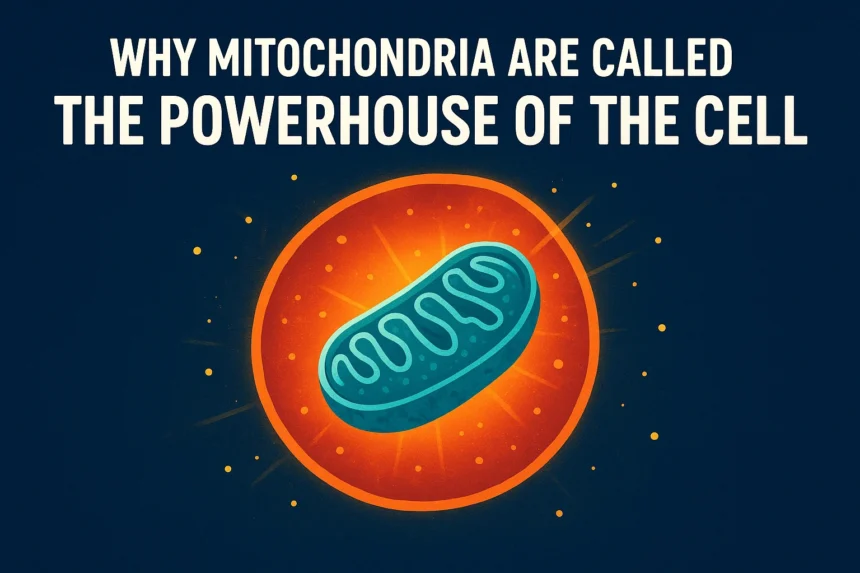Have you ever wondered why experts often call mitochondria the “powerhouse of the cell”? If your energy levels drop easily, the answer might lie deep inside your cells. The powerhouse of the cell mitochondria are tiny structures that fuel nearly every activity your body performs—from breathing and walking to digesting food and repairing tissues.
In this article, we’ll explore why mitochondria hold this title, how they impact overall health, and what you can do to keep them functioning at their best.
What Are Mitochondria?
Mitochondria are small, bean-shaped organelles found in almost every cell of the human body. They are often referred to as the “engines” or “power stations” because they produce adenosine triphosphate (ATP)—the molecule that stores and provides energy for cellular processes.
Without mitochondria, life as we know it would not be possible.
Why Are Mitochondria Called the Powerhouse of the Cell?
1. ATP Production: The Energy Currency
- Mitochondria convert glucose, fats, and proteins into ATP.
- ATP powers muscle contractions, brain activity, and even heartbeat.
- Without enough ATP, fatigue and weakness set in quickly.
2. Regulation of Cell Health
Beyond energy, mitochondria regulate apoptosis (cell death), ensuring unhealthy cells don’t damage the body.
3. Metabolic Control
They control how efficiently your body uses nutrients. Strong mitochondria mean better metabolism.
4. Heat Generation
Mitochondria also help maintain body temperature by producing heat, especially in brown fat.
Importance of Healthy Mitochondria for Overall Wellness
When mitochondria are healthy, you enjoy:
- Steady energy levels throughout the day.
- Improved focus and memory because the brain requires high energy.
- Stronger muscles and endurance during physical activities.
- Better resilience to stress and illness.
On the other hand, dysfunctional mitochondria can lead to:
- Chronic fatigue
- Poor immunity
- Faster aging
- Increased risk of degenerative diseases
Foods and Habits to Support Mitochondrial Function
🥦 Best Foods for Mitochondrial Health
- Leafy greens (spinach, kale) – packed with antioxidants.
- Fatty fish (salmon, sardines) – rich in omega-3s for cell membranes.
- Nuts and seeds – provide essential magnesium and CoQ10.
- Berries – loaded with polyphenols that protect mitochondria.
- Lean protein – supports repair and enzyme production.
👉 Related Article: Best Foods for Mitochondrial Health
💪 Lifestyle Strategies
- Regular exercise – especially interval training, strengthens mitochondria.
- Intermittent fasting – promotes mitochondrial renewal.
- Quality sleep – repairs and regenerates cells.
- Stress management – reduces oxidative damage.
Supplements and Advanced Support
Sometimes, food alone may not provide enough. Certain supplements are researched for mitochondrial health:
- Coenzyme Q10 (CoQ10) – helps with ATP production.
- Alpha-lipoic acid (ALA) – supports antioxidant defense.
- Carnitine – assists fat transport into mitochondria for fuel.
For a deeper supplement review, check out my detailed Mitolyn Review—a nutraceutical designed to support mitochondrial function and energy.
Real-Life Example
Think about marathon runners. Their stamina isn’t just about strong muscles—it’s about the number and efficiency of mitochondria in their muscle cells. Similarly, when everyday people struggle with fatigue, it often traces back to weak mitochondrial function.
FAQs
Q1: Why are mitochondria important for life?
Mitochondria provide energy (ATP) that powers nearly every body function, making them vital for survival.
Q2: What is ATP and why is it essential?
ATP is the energy currency of cells. Without it, muscles, organs, and tissues cannot function.
Q3: Can weak mitochondria cause disease?
Yes. Poor mitochondrial health is linked to conditions like chronic fatigue syndrome, neurodegenerative disorders, and metabolic diseases.
Q4: How can I naturally boost my mitochondria?
Eat nutrient-rich foods, exercise regularly, sleep well, and manage stress. Supplements like CoQ10 can also help.
Q5: Is mitochondrial health linked to aging?
Absolutely. Studies show mitochondrial decline accelerates aging, while supporting them can slow down age-related issues.
Mitochondria are rightfully called the powerhouse of the cell because they generate the energy that keeps us alive and active. By eating the right foods, adopting healthy habits, and considering supplements, you can boost mitochondrial function and improve your overall well-being.
👉 Want to go further? Read my detailed Mitolyn Review to explore how targeted nutraceuticals may give your energy and cellular health an extra edge.

